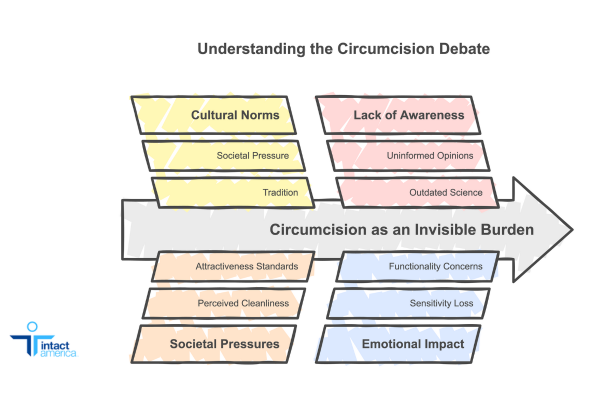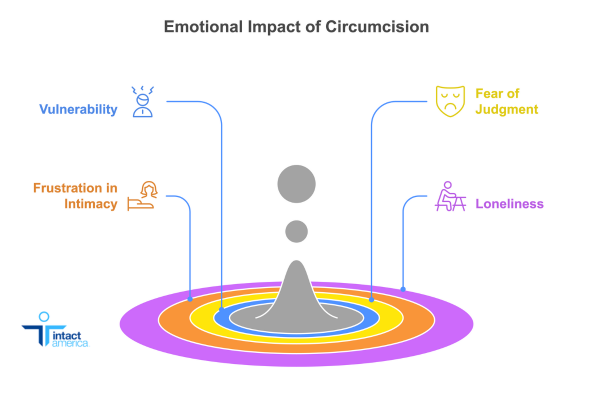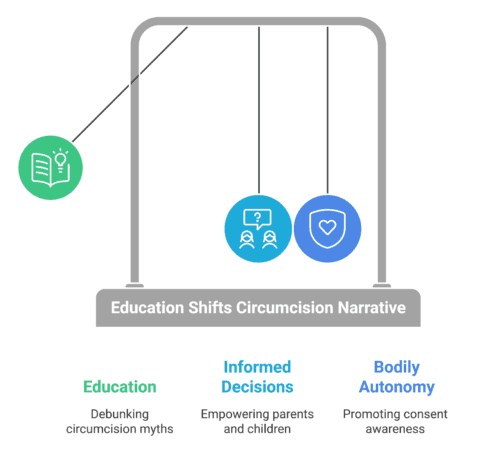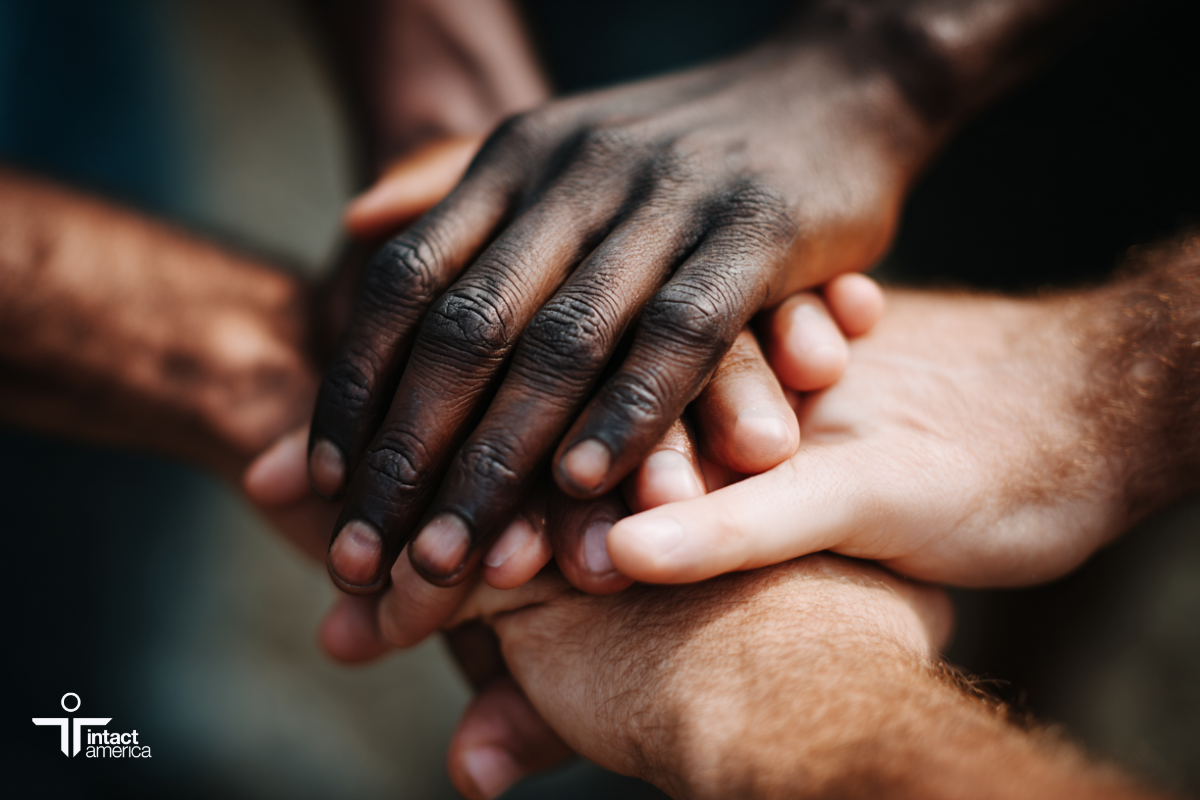
Circumcision and dating are two topics that rarely come up in the same conversation, yet they intersect in ways that profoundly impact many men’s lives.
The reality is that this isn’t just about cultural norms or personal preferences—it’s about identity, confidence, and autonomy.
For countless men, circumcision represents a silent struggle, often tied to anxiety, shame, or frustration in intimate relationships.
The Legacy of the Blade
 Circumcision is often framed as a medical decision, a supposed safeguard against infections or hygiene concerns. But beneath these explanations lies a practice rooted in tradition, societal pressure, and outdated science. For many men, it becomes an invisible burden carried into adulthood—a reminder that their body was altered without their consent to fit a standard they didn’t choose.
Circumcision is often framed as a medical decision, a supposed safeguard against infections or hygiene concerns. But beneath these explanations lies a practice rooted in tradition, societal pressure, and outdated science. For many men, it becomes an invisible burden carried into adulthood—a reminder that their body was altered without their consent to fit a standard they didn’t choose.
Society reinforces this burden with unspoken narratives. The idea that circumcision is cleaner, more attractive, or modern perpetuates harmful stereotypes. These beliefs find their way into dating, shaping how men are perceived in their most vulnerable moments. Comments like “Isn’t that unhygienic?” or “I’ve never been with someone uncut” can leave lasting marks.
The irony is that many people don’t fully understand what circumcision involves, let alone its physical and emotional consequences. It’s not just about aesthetics—it’s a permanent alteration that can impact sensitivity and functionality. Yet these nuances are often overshadowed by cultural biases.
Navigating Dating in a Judging World
In today’s world of dating apps and quick judgments, the pressure to meet societal standards has amplified. Men worry about being judged for something they have no control over, and the fear of rejection can loom large. Swiping through profiles and engaging in small talk becomes more complicated when the shadow of the circumcision stigma hangs overhead.
For intact men, this stigma can be isolating. Misconceptions about hygiene or appearance fuel self-doubt and anxiety, especially when faced with potential partners who have internalized those biases. The unspoken question—“What will they think?”—becomes a persistent source of stress.
Circumcised men, too, carry their own burdens. Many grow up believing their altered state is normal, only to later discover what was taken from them. The realization can feel like a betrayal, sparking anger, sadness, or a sense of loss.
The Emotional Toll

The psychological impact of circumcision is rarely discussed, but it’s deeply felt. For some, it’s a lingering sense of vulnerability or a fear of inadequacy. For others, it’s the frustration of being judged for something they had no say in. These emotions often manifest in dating, where intimacy can feel like a minefield of potential rejection or misunderstanding.
Adding to the pressure is the lack of open conversation around the topic. Circumcision is treated as a taboo, leaving many men to grapple with their feelings alone. Breaking this silence is essential—not just for individual healing but for challenging the societal norms that perpetuate these struggles.
Shifting the Narrative

Change begins with education. The myths surrounding circumcision—that it’s always necessary, cleaner, or superior—must be debunked. Major health organizations have acknowledged that the medical benefits of circumcision are minimal in most cases and can be achieved through proper hygiene. This knowledge needs to be more widely shared.
Advocating for bodily autonomy is equally important. Circumcision is a consent issue at its core. Parents often make the decision based on cultural, religious, or aesthetic reasons without fully understanding the lifelong implications for their child. By promoting informed decision-making, we can empower future generations to take control of their own bodies.
Reclaiming Confidence
For men navigating these challenges, the path to confidence lies in self-acceptance. Your worth isn’t defined by societal expectations or someone else’s preferences. Confidence comes from owning your body and recognizing that it’s not about meeting a standard but embracing who you are.
In the realm of dating, the right partner won’t care about your circumcision status. Someone who truly values you will see beyond superficial differences. If a partner judges you based on something so personal, they’re not the right match. Intimacy is about trust and connection, not cultural stereotypes.
A Call for Change
Circumcision is a brutal cultural practice with far-reaching implications. By addressing the stigma, advocating for informed consent, and fostering open dialogue, we can challenge the norms that have caused so many men unnecessary pain.
For those struggling with circumcision-related anxiety or shame, know that you’re not alone. Your value isn’t tied to someone else’s opinion, and societal expectations don’t diminish your worth. Whether circumcised or not, you deserve relationships built on respect and acceptance.
Ultimately, this isn’t about what has been cut or kept. It’s about cutting through harmful narratives and building a future in which body autonomy and self-worth take center stage.
People Also Ask These Questions About Dating and Circumcision
Q: Why is circumcision so stigmatized in dating and sexual relationships?
- A: Society has perpetuated myths that equate circumcision with cleanliness, attractiveness, or modernity, often ignoring the emotional and physical impacts it can have. This stigma can create pressure on men, leading to feelings of inadequacy or shame when dating. The stigma is compounded by a lack of open discussion about the topic, which makes it harder for individuals to feel confident and accepted.
Q: How can I navigate the pressure surrounding circumcision when dating?
- A: The key is to embrace self-acceptance and find partners who value you for who you are, not for your physical attributes. If someone judges you based on your body or something you had no control over, they may not be the right person for you. Open conversations with potential partners can help reduce misunderstandings and foster more acceptance.
Q: What are the long-term emotional effects of circumcision?
- A: Many men experience lingering feelings of vulnerability, anxiety, or frustration due to circumcision. These feelings can stem from a sense of loss or a fear of being judged for something they had no control over. Overcoming these emotional burdens requires self-acceptance, education, and conversations that challenge societal norms surrounding circumcision.
Q: How can we challenge the societal norms related to circumcision?
- A: Change begins with education and raising awareness about the minimal medical benefits of circumcision. Promoting bodily autonomy and informed consent is essential for future generations. It’s important to foster open discussions, debunk myths, and encourage self-acceptance so that individuals no longer feel pressured to meet cultural standards they did not choose.







No Comments